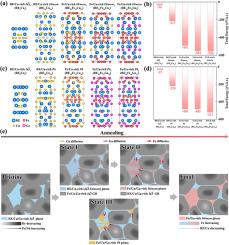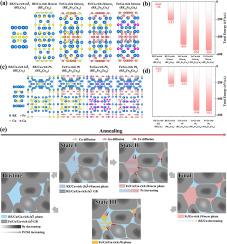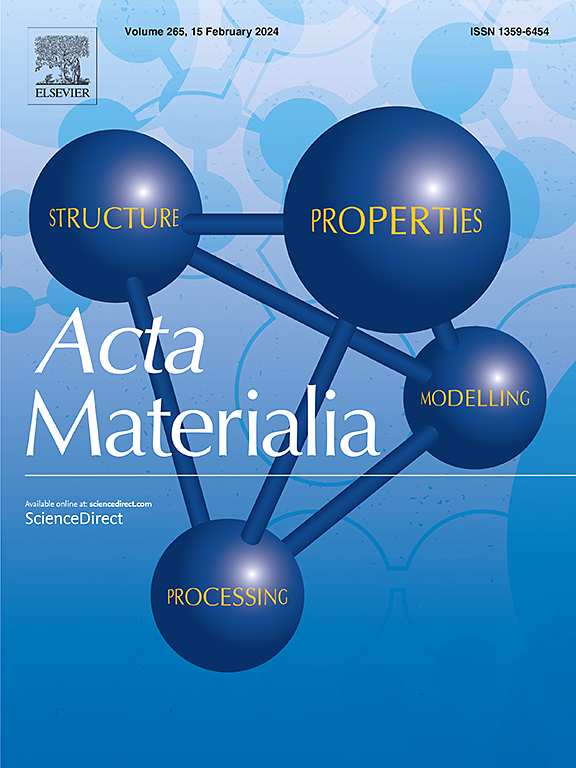烧结后退火 Nd-Dy-Fe-Cu-Ga-B 磁体中的晶间相变:从 Ia3¯ 立方结构到 I4/mcm 四方结构
IF 8.3
1区 材料科学
Q1 MATERIALS SCIENCE, MULTIDISCIPLINARY
引用次数: 0
摘要
高矫顽力钕铁硼永磁体主要取决于晶间相的有意调制,钕铁硼磁体中的 I4/mcm-四方 Nd6Fe13Ga 晶间相就是一个重要的体现。特别是对于含有多种稀土(RE)和合金金属(M)的钕-镝-铁-铜-镓-乙磁体,了解 RE6(Fe,M)14 晶间相的演化对于追求更高的矫顽力变得更加重要。在这里,我们设计了(Nd,Pr)29.0Dy3.0FebalCu0.5Ga0.5B0.9N1.15(N=Co、Al、Zr,重量百分比)烧结磁体,其中主要的富含 RE/Cu/Ga 的 Ia3¯ 立方晶间相聚集在三重结中。这些原始烧结磁体经过了宽温度范围的退火(390∼900 °C,3 小时)和宽时间范围的淬火(460 °C,0.5∼12 小时)。通过系统的显微结构表征和第一原理计算,揭示了从富含 RE/Cu/Ga 的 Ia3¯ 立方结构到富含 Fe/Ga 的 I4/mcm 四方结构的晶间相变以及伴随的元素偏析。在烧结后退火过程中,首先出现的是 "蜕变态 I",由纳米结构的 RE/Cu-rich Ia3¯ 立方和 I4/mcm-tetragonal 薄片组成,并出现了多孪晶和相干界面。然后,它演变成 "蜕变态 II",由富含铁/铜/镓的 I4/mcm-tetragonal 结构组成,其中铁/铜的浓度不断波动。与此同时,出现了 "蜕变态 III",表现为铜含量较低和晶体对称性降低的 P4-四方平板结构。最后,随着铜的同步放电,铁/镓向四方相晶格中的扩散增加,产生了热力学上更稳定的富铁/镓 RE6Fe13Ga 相。讨论了相变途径对矫顽力的影响,为优化 RE6(Fe,M)14 晶间相提供了宝贵的见解,并为增强矫顽力提供了更大的空间。本文章由计算机程序翻译,如有差异,请以英文原文为准。


Intergranular phase transformation in post-sinter annealed Nd–Dy–Fe–Cu–Ga–B magnet: From Ia3¯-cubic to I4/mcm-tetragonal structure
High-coercivity Nd–Fe–B permanent magnets crucially depend on the deliberate modulation of intergranular phases, notably exemplified by the I4/mcm-tetragonal Nd6Fe13Ga intergranular phase in the Nd–Fe–Ga–B magnet. Particularly, for the Nd–Dy–Fe–Cu–Ga–B magnet containing multiple rare earths (RE) and alloying metals (M), understanding the evolution of RE6(Fe,M)14 intergranular phase becomes more critical in the quest for higher coercivity. Here we design the (Nd,Pr)29.0Dy3.0FebalCu0.5Ga0.5B0.9N1.15 (N![]() Co, Al, Zr, wt.%) as-sintered magnets, where the major RE/Cu/Ga-rich Ia-cubic intergranular phase is agglomerated in triple junctions. These pristine as-sintered magnets are subjected to annealing over a wide temperature range (390∼900 °C for 3 h) and quenching over a wide time range (0.5∼12 h at 460 °C). Through systematic microstructural characterization and first-principle calculation, the intergranular phase transformation from RE/Cu/Ga-rich Ia-cubic to Fe/Ga-rich I4/mcm-tetragonal structure, and accompanying elemental migration is unveiled. During post-sinter annealing, metastable state I firstly occurs, consisting of nanostructured RE/Cu-rich Ia-cubic and I4/mcm-tetragonal lamellas, with the emergence of multi-twins and coherent interface. Then it evolves into metastable state II, consisting of lath-shaped Fe/Cu/Ga-rich I4/mcm-tetragonal structure with fluctuating Fe/Cu concentrations. Simultaneously, metastable state III occurs, exhibiting P6-hexagonal platelets with lower Cu content and reduced crystallographic symmetry. Finally, heightened Fe/Ga diffusion into the lattice of tetragonal phase with synchronous Cu discharge generates the thermodynamically more stable Fe/Ga-rich RE6Fe13Ga phase. The implication of phase transformation pathways on the coercivity is discussed, offering valuable insights into the optimization of RE6(Fe,M)14 intergranular phase and providing further opportunities for enhanced coercivity.
Co, Al, Zr, wt.%) as-sintered magnets, where the major RE/Cu/Ga-rich Ia-cubic intergranular phase is agglomerated in triple junctions. These pristine as-sintered magnets are subjected to annealing over a wide temperature range (390∼900 °C for 3 h) and quenching over a wide time range (0.5∼12 h at 460 °C). Through systematic microstructural characterization and first-principle calculation, the intergranular phase transformation from RE/Cu/Ga-rich Ia-cubic to Fe/Ga-rich I4/mcm-tetragonal structure, and accompanying elemental migration is unveiled. During post-sinter annealing, metastable state I firstly occurs, consisting of nanostructured RE/Cu-rich Ia-cubic and I4/mcm-tetragonal lamellas, with the emergence of multi-twins and coherent interface. Then it evolves into metastable state II, consisting of lath-shaped Fe/Cu/Ga-rich I4/mcm-tetragonal structure with fluctuating Fe/Cu concentrations. Simultaneously, metastable state III occurs, exhibiting P6-hexagonal platelets with lower Cu content and reduced crystallographic symmetry. Finally, heightened Fe/Ga diffusion into the lattice of tetragonal phase with synchronous Cu discharge generates the thermodynamically more stable Fe/Ga-rich RE6Fe13Ga phase. The implication of phase transformation pathways on the coercivity is discussed, offering valuable insights into the optimization of RE6(Fe,M)14 intergranular phase and providing further opportunities for enhanced coercivity.
求助全文
通过发布文献求助,成功后即可免费获取论文全文。
去求助
来源期刊

Acta Materialia
工程技术-材料科学:综合
CiteScore
16.10
自引率
8.50%
发文量
801
审稿时长
53 days
期刊介绍:
Acta Materialia serves as a platform for publishing full-length, original papers and commissioned overviews that contribute to a profound understanding of the correlation between the processing, structure, and properties of inorganic materials. The journal seeks papers with high impact potential or those that significantly propel the field forward. The scope includes the atomic and molecular arrangements, chemical and electronic structures, and microstructure of materials, focusing on their mechanical or functional behavior across all length scales, including nanostructures.
 求助内容:
求助内容: 应助结果提醒方式:
应助结果提醒方式:


